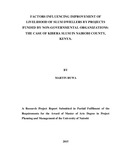| dc.description.abstract | This research set out to ask the following questions: What is the influence of management factors
on improvement of livelihood of slum dwellers by projects funded by Non-Governmental
Organizations in Kibera slum Nairobi County, Kenya? How does aid expenditure influence the
improvement of livelihood of slum dwellers by projects funded by Non-Governmental
Organizations in Kibera slum Nairobi County, Kenya? How does accountability influence the
improvement of livelihood of slum dwellers by projects funded by Non-Governmental
Organizations in Kibera slum Nairobi County, Kenya? How does monitoring and evaluation
influence the improvement of livelihood of slum dwellers by projects funded by NonGovernmental
Organizations in Kibera slum Nairobi County, Kenya? The study adopted a
descriptive survey research design. The targeted population was 70,938 and 700 project managers
and the eventual sample size was 382 heads of households in Kibera slum and 70 project
managers. A combination of stratified and systematic random sampling techniques was employed
to select a sample of 382 heads of households and 70 project managers; from 35 successful NGO
funded projects and 35 stalled NGO funded projects. The study used both primary and secondary
data. Primary data was collected with the help of a semi-structured questionnaire. Data was
analyzed by the use of descriptive statistics such as measures of central tendency (mean, mode
and median) and frequencies. Data was presented using frequency and percentage tables. The
study found out that majority of the respondents in Kibera slum had primary education which is
considered a factor influencing NGO funded project success. The findings indicate that donor
aided projects created self-sufficiency through livelihood projects among the slum dwellers. The
findings have shown that donor funded projects have primarily focused on service provision
aspects of the livelihood of the slum dwellers. The study recommends that management and
communication are among the critical factors in the success of donor funded projects. Stakeholder
involvement has a great influence on projects and it is nearly impossible to achieve project
outcomes without involving stakeholders in the project processes. The study recommends that
there is a need for greater accountability and regulation of donor funded projects operating in
Kibera slum. More funding should also be awarded to projects to engage more critical expertise
in order to make easy to address project issues and processes. It is important that the
implementers of these projects/programs have skills of management, accountability, monitoring
and evaluation. Further research is needed on how to help improve community participation in
donor funded projects. Future research studies should therefore be undertaken to incorporate a
larger number of respondents and project managers in the study. | en_US |

